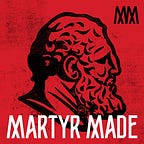I had a very interesting conversation with Luke Burgis, whose book Wanting: The Power of Mimetic Desire in Everyday Life had a very good effect on me recently. We talk about Rene Girard, Nietzsche and Dostoevsky, scapegoating, and how technology accelerates mimetic conflict. I hope you enjoy this discussion.
ANNOUNCEMENT: With this episode in the rearview, I am now going to be focusing 100% on putting the finishing touches on the first episode of the next Martyr Made history episode. Should be about 1.5-2 weeks more work, but it’s going to be a banger. So if something comes to mind, I might record an episode for Substack, but otherwise I’ll be buried in my cave working on that.
Luke Burgis is Entrepreneur-in-Residence and Director of Programs at the Ciocca Center for Principled Entrepreneurship at The Catholic University of America in Washington, D.C. After a brief career in investment banking and private equity, he started his first company at age 23 and was named a “Top 25 Entrepreneur Under 25” by Business Week for growing it into one of the most innovative food access businesses in the country.
Luke is also the founder of two more startup companies that he led as C.E.O. to high growth and sustainability. Fit Fuel, the e-commerce company that he founded, has been recognized as having an outstanding company culture. He formed a close partnership with Zappos.com.
Luke is co-author of the book Unrepeatable: Cultivating the Unique Calling of Every Person. He is also a recognized expert in René Girard's mimetic theory and author of the book Wanting: The Power of Mimetic Desire in Everyday Life (St. Martin's Press, 2021). He has a B.S. from the Stern School of Business at New York University and an S.T.B. in Sacred Theology from the Pontifical University of the Holy Cross.





